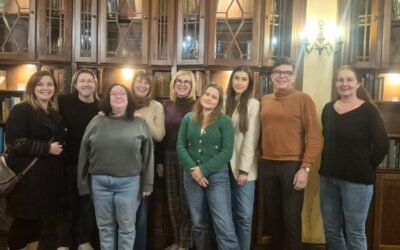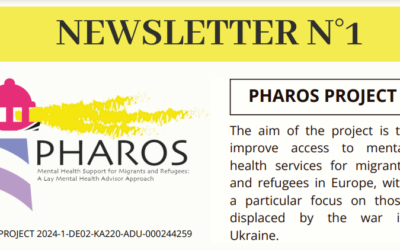About the Project
Want to support migrant well-being in your community? Join us in building inclusive, peer-led mental health solutions across Europe.

PHAROS Story
Inspired by the ancient lighthouse of Pharos, this project acts as a beacon for migrants and refugees across Europe who face invisible challenges related to mental health. PHAROS aims to empower communities by training migrants to become lay mental health advisors, building stronger peer support networks and equipping educators with the tools to offer culturally responsive care and guidance.
Many newly arrived migrants and refugees, particularly those displaced by the war in Ukraine, struggle to access mental health services due to language, stigma, and systemic barriers. PHAROS offers a community-driven and peer-led solution to overcome these challenges.
Through tailored training and the creation of safe, trust-based peer networks, the project supports both settled migrants and adult education professionals in enhancing mental health awareness, resilience, and inclusion.

Project partners
The PHAROS partnership brings together six dedicated organizations from across Europe, each with unique strengths in adult education, mental health, migrant support, digital learning, and social inclusion. Together, they form a dynamic team committed to empowering migrants and refugees through innovative, community-based solutions. This diverse consortium ensures that the project responds to real needs, combining educational expertise, intercultural understanding, and practical experience.

Coordinator: INTEGRA Filder e.V. (Germany)
INTEGRA Filder e.V. is a non-profit, community-based organization with a long-standing commitment to supporting the integration and empowerment of migrants and refugees in Germany. Through a combination of educational programmes, psychosocial support, and intercultural training, INTEGRA promotes social inclusion and well-being. As the coordinator of the PHAROS project, INTEGRA brings leadership, expertise in adult education, and valuable experience in the design and delivery of intercultural learning activities aimed at vulnerable groups.
Druzhestvo Znanie (Bulgaria)
Druzhestvo Znanie is an educational association dedicated to promoting lifelong learning, civic engagement, and intercultural dialogue. With deep experience in developing adult training programmes, Znanie works closely with vulnerable groups including migrants, ethnic minorities, and unemployed adults. Within PHAROS, the organization contributes to the development and piloting of training modules, and supports the establishment of peer networks that foster community support and mental health awareness.


DOREA Educational Institute (Cyprus)
DOREA is a leading provider of adult, youth, and professional education programmes in Cyprus and across Europe. Known for its strong focus on non-formal learning and personal development, DOREA delivers training on a wide range of topics, including mental health, emotional intelligence, and social inclusion. In PHAROS, DOREA leads the development of the online learning platform, coordinates the digitisation of training content, and ensures the accessibility and dissemination of the project’s key resources.
SOLUTION: Solidarité et Inclusion (France)
SOLUTION is a non-profit organization working to advance inclusion, solidarity, and social cohesion across France and beyond. The organization supports vulnerable populations through a wide range of activities, including non-formal education, access to healthcare, mental health awareness, and advocacy for human rights. As a PHAROS partner, SOLUTION brings critical expertise in working with refugee and migrant communities and helps ensure the project’s outputs are grounded in real community needs and experiences.


Unofficial Media and Training Limited (Ireland)
Unofficial Media and Training (UMT) combines education, creativity, and community outreach. Specialising in digital storytelling and inclusive training, UMT works with marginalised groups to amplify their voices and enhance their skills. In the PHAROS project, UMT plays a key role in developing engaging, accessible learning content for both migrants and educators. It also contributes to curriculum design and supports innovative, learner-centred approaches that address the real-life challenges of migrant mental health.
Soros International House (Lithuania)
Soros International House (SIH) is a well-established language and education centre with a strong reputation in adult education, intercultural learning, and social inclusion. The organization is highly active in EU-funded projects, particularly those focused on digital learning and innovation in teaching. Within PHAROS, SIH contributes to the development of inclusive training methodologies, supports the creation of accessible learning resources, and ensures that mental health education is tailored to the diverse needs of migrant communities.

Latest News
Check out our latest updates and activities, and see how you can get involved in making a positive impact.
Kicking off curriculum development
On Thursday, April 10, the PHAROS project partners came together for a productive online meeting focused on the development of our very first project output – the Lay Mental Health Counsellor Curriculum for Migrant Learners. This comprehensive 30-hour training...
Partners meet in Navan, Ireland
The Erasmus+ KA2 “Pharos” project partners recently gathered in Navan, Ireland, marking an important milestone in our collaborative journey towards enhancing mental health support for migrants and refugees across Europe. This productive meeting provided an...
PHAROS: first newsletter released
We are thrilled to announce the release of Newsletter No.1 for the Erasmus+ KA2 PHAROS Project, a crucial initiative aimed at improving mental health support for migrants and refugees across Europe. This first edition provides an overview of the project’s objectives,...

DISCLAIMER
Funded by the European Union. Views and opinions expressed are however those of the author(s) only and do not necessarily reflect those of the European Union or the European Education and Culture Executive Agency (EACEA). Neither the European Union nor EACEA can be held responsible for them.


